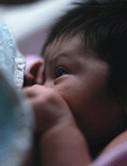Breast-feeding may have dental benefits, study suggests

(HealthDay)—The more babies breast-feed, the less likely it is that they will develop any kind of misalignment in their teeth later on, a new study shows.
But pacifiers can negate some of that potential benefit, even if the children are breast-feeding, the Australian researchers said.
"While most benefits of breast-feeding can be attributed to the breast-milk, this study highlights one of the ways that the actual act of breast-feeding imparts its own benefits," said Dr. Joanna Pierro, a pediatric chief resident at Staten Island University Hospital in New York City.
"While it is well established that exclusively breast-fed babies are at a decreased risk of dental malocclusion [misalignment], this study revealed the differences between those exclusively breast-fed versus those who are predominantly breast-fed," said Pierro, who was not involved in the study.
"Since many breast-fed babies today are partially fed breast-milk from a bottle, this research reveals how this difference affects the oral cavity," she added.
The researchers, led by Karen Peres at the University of Adelaide in Australia, tracked just over 1,300 children for five years, including how much they breast-fed at 3 months, 1 year and 2 years old. The study authors also asked how often the children used a pacifier, if at all, when the kids were 3 months, 1 year, 2 and 4. About 40 percent of the children used a pacifier daily for four years.
When the children were 5, the researchers determined which of them had various types of misaligned teeth or jaw conditions, including open bite, crossbite, overbite or a moderate to severe misalignment.
The risk of overbite was one-third lower for those who exclusively breast-fed for three to six months compared to those who didn't, the findings showed. If they breast-fed at least six months or more, the risk of overbite dropped by 44 percent.
Similarly, children who exclusively breast-fed for three months to six months were 41 percent less likely to have moderate to severe misalignment of the teeth. Breast-feeding six months or longer reduced their risk by 72 percent.
The findings were published online June 15 in the journal Pediatrics.
While the study found an association between breast-feeding and dental health, it did not prove a cause-and-effect link.
But Peres offered some possible explanations for the association.
"The plausible mechanisms which may explain the association between exclusive breast-feeding and lower risk of having [misaligned teeth or jaws] . . . include the adequate development of the orofacial structures in children who are breast-fed, such as proper muscular tone and nasal breathing," Peres said. "In addition, children who are breast-fed are less likely to use a pacifier, which is considered a risk factor for malocclusion."
Pierro explained it this way.
"Unlike feeding with a bottle, breast-feeding requires the baby to move her jaw and tongue in ways that help develop the oral cavity," she said. "So long before baby breaks her first tooth, she is creating the foundation for proper alignment of the teeth."
The findings may also reflect the effects of a baby getting regular jaw exercise through the act of breast-feeding, suggested Dr. Danelle Fisher, vice chair of pediatrics at Providence Saint John's Health Center in Santa Monica, Calif.
"Breast-feeding requires the use of jaw muscles more so than bottle-feeding, so the mechanics of breast-feeding stimulate muscle tone in the jaw," Fisher said.
Open bite, overbite and moderate to severe misalignment were generally less common overall among the children who mostly or exclusively breast-fed. Children who mostly breast-fed but also used pacifiers, however, were slightly more likely to have one of these misalignment issues, the study found.
"Pacifiers are used for non-nutritive sucking but when overused, they can put pressure on the developing jaw and lead to more problems in older children with malocclusion [teeth/jaw misalignment]," Fisher said.
That does not mean parents need to toss the pacifiers, however. The American Academy of Pediatrics recommends that parents consider using a pacifier for an infant's first six months because pacifiers are associated with a reduced risk of sudden infant death syndrome (SIDS).
"Most infants need to suck for comfort or non-nutritive sucking," Fisher said. "Pacifiers can be helpful in the newborn period and even help reduce incidents of SIDS in infants who sleep with them."
Instead, parents should simply limit pacifier use, she said. In addition, pacifiers are not needed past the first six to 12 months, Fisher said, so parents can begin weaning after that time.
More information: For more about breast-feeding and its benefits, visit the U.S. Office on Women's Health.
Copyright © 2015 HealthDay. All rights reserved.


















